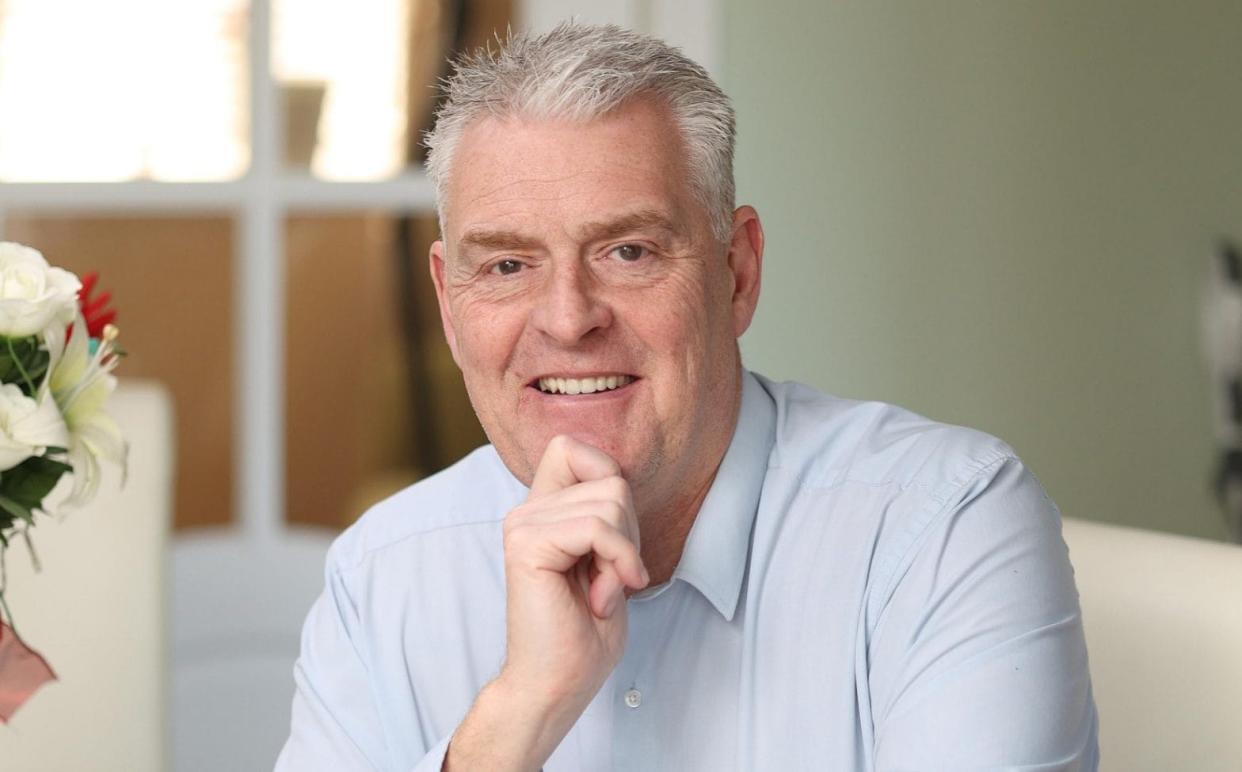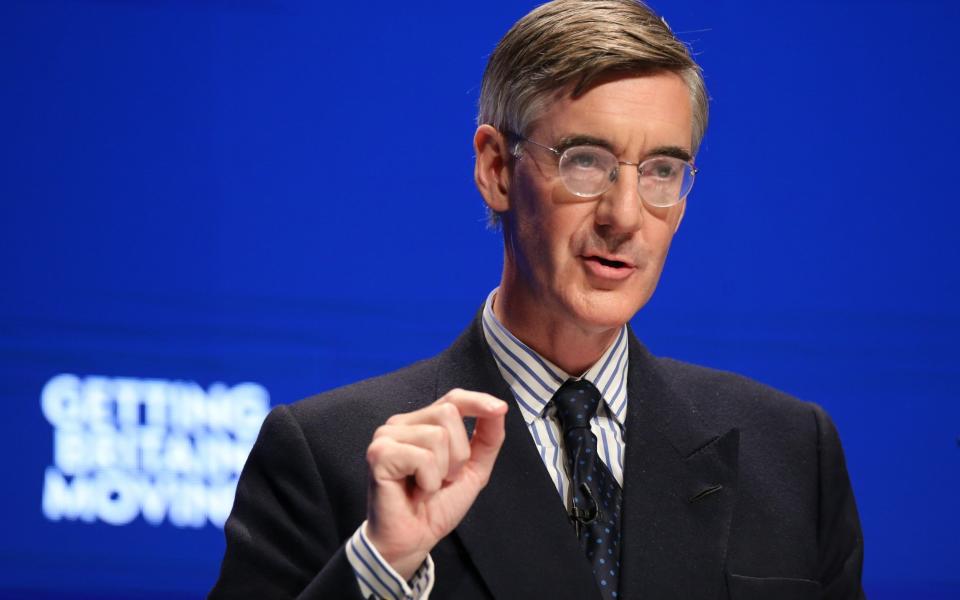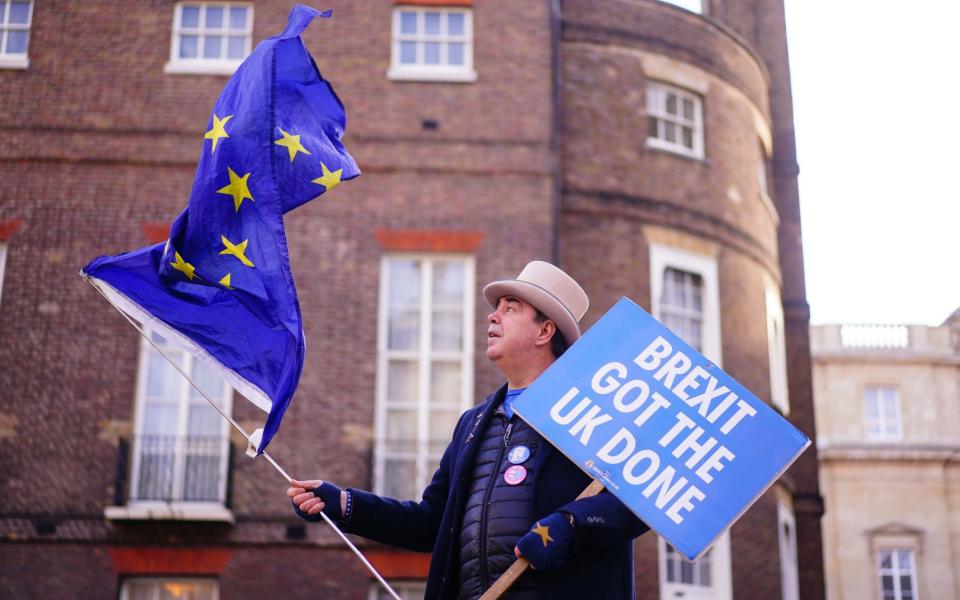Lee Anderson: ‘Food bank users are often wasting money on fags, booze and Sky TV’

Lee Anderson was holed up in his favourite Nottinghamshire pub late on Friday, boasting on Twitter how he had been able to buy a round of drinks and a packet of pork scratchings for £6.90. “Only in Ashfield,” he told his 48,000 followers.
Anderson is not your usual Conservative MP. A former miner and Labour councillor, he only jumped ship to the Tories a year before winning his Ashfield seat at the 2019 general election.
The pub – the New Cross – like Ashfield itself has only recently come around to welcoming Tories. “It is one of those pubs where they used to sweep the teeth up on a Sunday afternoon. It has still got the same clientele coming in,” he says. “I walked in the other week and they all stood up and clapped me. I would have got chased out of this pub 10 years ago if I had dared walk in as a Tory.”
Anderson needed the drink at the end of a week when he was criticised for using the salary details of a staff member to try to demonstrate how it is possible to survive on a low income as the debate about food banks raged. He now appears to regret his post on Twitter as he refuses to discuss it because of the online abuse that has been directed his aide’s way, and asks The Sunday Telegraph not to name her.
Anderson was trying to make the point that often people who are driven to use food banks need help with budgeting their finances, drawing on his experience working at his local Citizens Advice Bureau before he became a MP. “We would sit down with a service user and decide why they have the use of a food bank. In a lot of cases, it was people who had relationship breakdowns, or a sudden illness or disability or whatever, a sudden change in circumstances. There is nothing wrong with that.”
But when he filled out an income and expense sheet for others, he often found people were spending money on luxuries they simply did not need. “In a lot of cases these people were just wasting money on fags and booze and non essentials, non priority debts, Sky TV or Virgin Media.
“There was a lot of money they could save. There were takeaways, holidays. In this world, you don’t have the automatic right to have all the nice things in life. You have to work for them and you have to pay for them.”
Anderson blames what he describes as an “industry” behind food banks, which leaves people relying on them and unable to navigate their own way out of poverty. “Yes, there is a need for food banks for some people who fall on hard times all of a sudden. But there’s a whole industry now. In my opinion this is a scandal,” he says. “We should be teaching a man to fish. If we get back to the basics, get people to help themselves, give them a hand up rather than a hand out, this country would be even better.”
The point here is that ANYONE (not just nurses) earning *MORE* than 30k, & are using foodbanks must have a budgeting problem. I have constituents i.e armed forces, bin men, bar staff, care workers, bus drivers, pensioners etc who can all live on less. Am I missing something ? pic.twitter.com/PucUIBsolH
— Lee Anderson MP (@LeeAndersonMP_) January 19, 2023
Trying to make these points in the nuance-free zone of Twitter often lands Anderson in hot water. He is nicknamed “30p Lee” after a local chef showed him how to produce 172 meals – costing about 30p each – to feed a family of five from an outlay of just £50 a week at a local Aldi.
Anderson blames a dependency culture which he can trace back to the tax credits system pioneered by former Labour prime minister Tony Blair and his chancellor Gordon Brown – and continued with some enthusiasm by their Conservative successors – for leaving people trapped on low incomes.
“Overnight, they made it more attractive for people not to go to work full time. You could earn the same money for 16 hours a week,” he says. “Three generations later, the unintended consequence of that is people are stuck in entry level jobs and the employers have not been able to upskill their own staff because they are refusing to work longer hours.
“We’ve got to break that cycle. We’ve got to tell people that the way to get that new car or have that holiday abroad is not by having your income topped up on Universal Credit, it’s by promotion.”
Anderson, 56, has lived and worked his entire life in and around Ashfield, Nottinghamshire. With his two sisters, Lisa and Paula, he grew up in Huthwaite, a mining village. His mother Jennifer was a factory worker and his father Paul was a miner.
“We had vegetables in the garden. At the bottom of the garden we had chickens and rabbits and ducks. “When it was dinner time we had one of them,” he says. “I’ll take no lectures from anybody about being hard up ... That was our food bank, our back garden.” He says that “we didn’t have a pot to p--- in when we were kids. We really didn’t. We were brought up with plenty of love in the house. But we had absolutely nothing.”
He left Ashfield School with several O-levels taking local jobs – including a year as a labourer in a concrete factory – until he finally got a job as a miner, working alongside his father, in the mid-1980s. Over 10 years Anderson worked at four collieries in the area – Sutton, Welbeck, Creswell, where he had coalface training, Manton, before returning to Welbeck. He says: “I had it really tough in the early 90s. I was working seven days a week down a coal mine, working 12 hours and 14 hours on a night shift, seven nights on the trot and hardly any money at the end of the week. And that’s what I did.
“When my first missus got pregnant with our second child, I had to go to my boss at the pit and say, ‘I’m working six days, I need a Sunday shift’.
“There was no social media for them to complain to. I didn’t blame the government. I thought, ‘I’d got her pregnant, it was my job to feed my kid’.”
Anderson and his partner separated, and he went on to raise his two sons Charlie and Harry, now 31 and 29, on his own. At one point he sold his car to make ends meet. “I walked everywhere. I was not one of those people who were whinging and moaning, I thought, ‘That’s an expense. I could walk and catch the bus. I can walk kids to school’.”
Anderson says his work ethic was instilled by his father. “My dad always told me that if I wanted nice things, I had to go to work and if I wanted even nicer things, I had to do more work,” he says.
Anderson left the pits in 1997 to devote his time to his sons, before volunteering for and then eventually starting work at the Citizens’ Advice Bureau. He also started to dip his toe in Labour politics, eventually being elected as a local councillor for the party in 2015.
However, his political conversion to the Tories happened in February 2018 when he was suspended by his local Labour Party for receiving a community protection warning from Ashfield District Council “after placing boulders to deter travellers from setting up camp at a site in the area”, according to the Mansfield Chad newspaper.
He quit Labour to join the Tories the following month, telling the BBC at the time “the Labour Party has been taken over by the hard-left and Momentum in particular and I will play no part in that. It’s been a very difficult decision to come to”.
Anderson won Ashfield for the Conservatives at the December 2019 general election, with a majority of 5,733 over an independent candidate who pushed Labour into third place, turning the seat blue for the first time in 22 years. Since entering Parliament, Anderson has formed close bonds with millionaire Tory MPs like Richard Drax and Jacob Rees-Mogg.
“I can honestly say that some of the people who made me feel the most welcome, being a working-class bloke, are people like Richard Drax and Jacob Rees-Mogg,” he says. Perhaps unsurprisingly, he has signed up to the Common Sense Group of around 40 Tory MPs which campaigns against woke issues.

Anderson notes how the childhood friends he grew up with in “one of the roughest parts of Ashfield” have done well. “They’ve seen where they’ve come from and thought ‘F--- that, I want a decent life’. They’ve got strong Conservative values – aspiration. And they want their children to do a little bit better than what they’ve done.” Rishi Sunak, the millionaire Prime Minister, and other privileged Conservatives, can “sympathise” but not “empathise” with the poor. “It’s not their fault how they were brought up,” he says.
The Tory grassroots seem to have taken Anderson to their hearts. He is often booked to speak at southern Tory associations, desperate to hear from their new cousins in the party’s Red Wall. In the weeks leading up to Christmas he was asked to address local Conservatives in Chipping Barnet, Ipswich and leafy Kensington, among others, to hear him deliver “straight talking with a healthy slice of common sense”, according to one association.
Anderson is convinced he can hold his seat at the next general election and even – despite the polls – is cautiously optimistic about the Tories’ chances to hold on to power – as long as Sunak adopts what he describes as “Conservative policies”. A lot of my voters – especially the first time Tory voters – voted for a Conservative government: can we please have some Conservative policies?
“I know that we’ve been interrupted by Covid, the war in Ukraine and now the strikes, but Rishi has got nearly two years to turn it around. Hopefully in the run-up to the next general election, people in this country can start to see what a Conservative government is all about. And that means cutting taxes, cutting business rates, making sure that work pays, securing our borders, that there’s more police on the street, and sorting these strikes out.”
One of his ideas is for the Government to do more to stop people “abusing the system”. He takes aim at “those people that quite frankly don’t want to go to work. People who are feigning illness. I used to see them on a daily basis in my time at Citizens Advice Bureau.
“I’d see people coming in on two sticks, or could hardly walk, and then Friday I’d see them downtown on the dance floor at the disco. We know that happens.
“It’s not fair on the decent hard-working taxpayer in this country who puts a shift in, works seven days a week, and never sees the kids because they are working all the hours God sends.”
He adds: “We as a government, as a Conservative Party, need to come down heavily on the side of the hard-working British taxpayers, showing that we really care about them.”
He wants to see more government ministers promoting “personal responsibility” among the population and stopping a tendency among people to look for help from the state. Anderson describes this “can do” spirit as “the mentality of the Red Wall”. He says: “The Government has got to start promoting personal responsibility as well as aspiration.
“It is your family, you provide for them. Make sure that you live in a safe, decent country with good education, a good health-care system and a good police force.”
Anderson worries that the voice of an older generation who had to make do with what they had got when funds ran low is being replaced by one which expects the state to step in. “It’s not the state or the Government’s job to pay people more money. It’s your own job to support your family,” he says.
“The generation of people that support me on this sadly are getting older and dying. And the new generation has probably not got those sorts of ideas and I think that’s a dangerous thing.”
Although he uses his Twitter feed to take his message of self-reliance to voters, he blames social media for leaving younger generations feeling entitled. Asked why he is urging people to live within their means, he says: “There is a big sense of entitlement in this country.
“People automatically think they should have things. You see five-year-old kids with tablets and iPhones. “Back in the day if I got a hole in my socks, my mum sewed them up for me. Nowadays, you just chuck them in the bin and you get three new pairs for two quid from Asda.” Anderson is bemused that people cannot find work: “In this country now, we’ve got over a vast number of vacancies. So there is no excuse at all for people being out of work.”
For his fans, Anderson is a rare blast of common sense in Westminster, which can often get overwhelmed by issues which mean little outside SW1. Take this week’s row over the Government’s plans to ban trans conversion therapy. “There is a tiny amount of the population who are genuinely affected by it. And we must respect that and we must support and help,” he says. “But the campaign side of it are normally middle-class white blokes, in skinny jeans with silly beards and who’ve probably got hemp slippers on.
“These are ones that are campaigning and have been a right nuisance about it. These sorts of people look for a minority group and then keep telling them that they’re victims. They keep telling them the world’s against them and the world’s not against them.”
He adds: “Over the years, I’ve knocked on thousands of doors, spoken to literally tens of thousands of people, and nobody’s ever brought this nonsense up.”
As a miner, Anderson went on strike a couple of times when John Major’s Tory government was closing mines in the early 1990s but now considers it “a pointless gesture”. His advice for today’s public sector workers who are striking over pay is to “put the family first, not the union”.
He says: “You can carry that through your life sometimes being bitter and having that ‘poor me syndrome’ and blaming everybody else.
“Other people are getting on with their life, working, grafting, getting another qualification, doing overtime and providing for their families.”
As his followers will know, Anderson appears to enjoy winding up his critics on social media. His regular altercations with Steve Bray, an anti-Brexit campaigner who spends his time heckling Tories in Westminster through an outsized megaphone, often spread virally.
On Friday, Anderson took it to the next level by challenging Bray to a boxing match to settle their differences. He told me on Chopper’s Politics podcast: “He is a nuisance. And I’ve got a challenge for him: meet me in the boxing ring. Let’s do three rounds. And if I win, he never protests out there again. And if he wins, I’ll go and protest with him.”

Anderson, who is married to his second wife Sinead, 45, a Conservative councillor on Mansfield District Council, who suffers from cystic fibrosis and had a double lung transplant in 2020, wants to raise money from any boxing match for a male suicide charity after the 30-year-old son of his friend Graham Lynk took his own life a month ago.
Graham’s son Sean “was a big handsome man,” he says. “He had a smile that would light any room up, nobody saw it coming, he said goodbye to his Dad one night. He said ‘I will see you at work’ and then he went home and took his own life.”
Ahead of any bout, Anderson has just started a diet to cut his weight from 17st 2lb to 15st 8lb. A weekly weigh-in recorded on Twitter is promised. And he is getting inspiration from his Twitter feed. “This week I’ve been called a lard a--- potbelly MP. I’ve been called a fat b------ all over Twitter. Most of them are hidden profiles, keyboard cowards,” he says.
“I used to watch Popeye as a kid. Every time he had his tin of spinach, he got stronger and that’s what it is like for me every time I got one of these horrible comments. My haters are my motivators.”
Listen to Christopher Hope’s interview with Lee Anderson on Chopper’s Politics Podcast at playpodca.st/Chopper or wherever you listen to your podcasts

 Yahoo News
Yahoo News 
